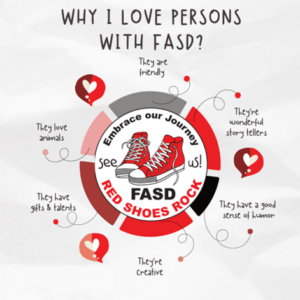Article source: FASD Hub South West
On 9th September each year, the National Institute on Alcohol Abuse and Alcoholism (NIAAA) recognises International Fetal Alcohol Spectrum Disorders (FASD) Awareness Day as a reminder that that there is no safe amount of alcohol consumption during pregnancy.
This year marks the 50th anniversary of the publication of the first clinical reports by researchers identifying fetal alcohol syndrome as it was called then, now known internationally as Fetal Alcohol Spectrum Disorder (FASD). Today, the term FASD refers to the collective lifelong physical, behavioural, and cognitive impairments that occur due to prenatal alcohol exposure. FASD is irreparable brain damage.
FASD-related impairments can range from mild to severe and contribute to a variety of issues such as learning disabilities, speech and language delays, visual and hearing problems, problems with critical organs, and social challenges throughout a person’s life. In the UK and Internationally, prenatal alcohol exposure is a leading preventable cause of birth defects.
This FASD Awareness Day, learn more about how important early intervention is to support health by exploring FASD HUB South West pages and National Organisation for FASD.
Support groups
In our region, there is a local parent-led support group for families and friends of children, young people, and adults with or without a formal diagnosis of Fetal Alcohol Spectrum Disorder (FASD) across the South West, FASD Hub South West.
Below, FASD Hub South West share how you can get involved:
Be ‘Stronger Together’ by joining one of the South West parents groups, ‘Ask the Expert’ events or online Facebook groups here.
New! You are welcome to join a brand new online Facebook support group for FASD carers and parents with twins, triplets and those with siblings very close in age. We share the challenges and celebrate the success in supporting siblings with similar or very different needs; we share ideas, learn about new research and explore ways to support emerging needs whilst navigating the system from education to finding diagnosis.
Your support is welcomed to grow our community of support!
How you can help
- Join Red Shoes Rock FASD Aware group to find out more about the international ‘light up’
- Hold a local community event and SHARE it with FASD HUB South West to support local families, contact them by emailing: fasdsouthwest@gmail.com
- For September 9 enlist your community to LIGHT UP with torches or lamps a monument, bridge, or building.
- Ask your place of faith to ring bells at 9:09 am and 9:09 pm.
- For the months of September request a proclamation from your mayor or governor.
- Host a local 5K event.
- Celebrate your community, honour families and individuals with lived FASD experience.
Everyone can play a part!

In 2024, the ‘Red Shoes Rock’ FASD Aware campaign continues to gain momentum.
Could you wear something red to work or at home on the 9th day of the 9th month?
One of the focal points is the annual “Light Up the World” event. On this day, individuals are invited around the globe to don their red shoes, illuminating their cities, towns, and social media platforms with a collective message of support and understanding. Keep an eye out or encourage your local landmarks, buildings, and social media profile to ‘light up’ or be bathed in red, symbolising unity and advocacy.
So, let’s lace up our red shoes, not just on designated awareness days, but every day. Let’s shine a light on FASD, fostering a world where understanding and acceptance flourish. Together, we can make a difference—one step, one pair of red shoes at a time!
Let’s encourage the people in our lives to take actionable steps to support people with the neuro developmental disorder FASD. Reflect on what you can do personally to support raising awareness.
Take time to make no assumptions with bitesize training, spread awareness or fundraise in your community to support local groups who support families with neurodiversity can really make a massive difference.
FASD is so much more!
“When you know one person with FASD you know ONE person.”